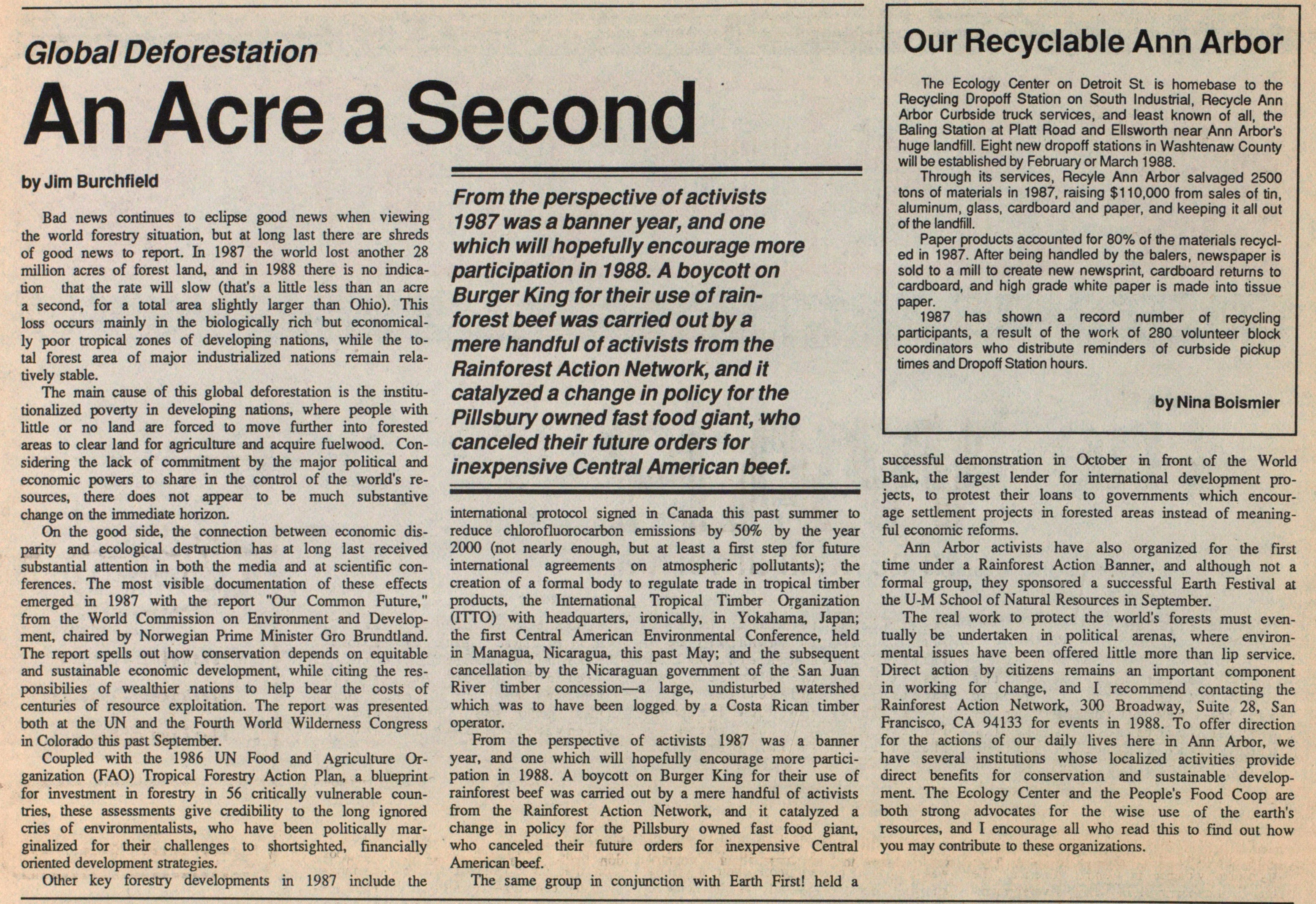Global Deforestation An Acre A Second

Bad news continues to eclipse good news when viewing the world forestry situation, but at long last there are shreds of good news to report. In 1987 the world lost another 28 million acres of forest land, and in 1988 there is no indication that the rate will slow (that's a little less than an acre a second, for a total area slightly larger than Ohio). This loss occurs mainly in the biologically rich but economically poor tropical zones of developing nations, while the total forest area of major industrialized nations remain relatively stable.
The main cause of this global deforestation is the institutionalized poverty in developing nations, where people with little or no land are forced to move further into forested areas to clear land for agriculture and acquire fuelwood. Considering the lack of commitment by the major political and economic powers to share in the control of the world's resources, there does not appear to be much substantive change on the immediate horizon.
On the good side, the connection between economic disparity and ecological destruction has at long last received substantial attention in both the media and at scientific conferences. The most visible documentation of these effects emerged in 1987 with the report "Our Common Future," from the World Commission on Environment and Development, chaired by Norwegian Prime Minister Gro Brundtland. The report spells out how conservation depends on equitable and sustainable economic development, while citing the responsibilities of wealthier nations to help bear the costs of centuries of resource exploitation. The report was presented both at the UN and the Fourth World Wildemess Congress in Colorado this past September.
Coupled with the 1986 UN Food and Agriculture Organization (FAO) Tropical Forestry Action Plan, a blueprint for investment in forestry in 56 critically vulnerable countries, these assessments give credibility to the long ignored cries of environmentalists, who have been politically marginalized for their challenges to shortsighted, financially oriented development strategies.
Other key forestry developments in 1987 include the international protocol signed in Canada this past summer to reduce chlorofluorocarbon emissions by 50% by the year 2000 (not nearly enough, but at least a first step for future international agreements on atmospheric pollutants); the creation of a formal body to regulate trade in tropical timber products, the International Tropical Timber Organization (TTTO) with headquarters, ironically, in Yokahama, Japan; the first Central American Environmental Conference, held in Managua, Nicaragua, this past May; and the subsequent cancellation by the Nicaraguan government of the San Juan River timber concession - a large, undisturbed watershed which was to have been logged by a Costa Rican timber operator.
From the perspective of activists 1987 was a banner year, and one which will hopefully encourage more participation in 1988. A boycott on Burger King for their use of rainforest beef was carried out by a mere handful of activists from the Rainforest Action Network, and it catalyzed a change in policy for the Pillsbury owned fast food giant, who canceled their future orders for inexpensive Central American beef.
The same group in conjunction with Earth First! held a successful demonstration in October in front of the World Bank, the largest lender for international development projects, to protest their loans to governments which encourage settlement projects in forested areas instead of meaningful economic reforms.
Ann Arbor activists have also organized for the first time under a Rainforest Action Banner, and although not a formal group, they sponsored a successful Earth Festival at the U-M School of Natural Resources in September.
The real work to protect the world's forests must eventually be undertaken in political arenas, where environmental issues have been offered little more than lip service. Direct action by citizens remains an important component in working for change, and I recommend contacting the Rainforest Action Network, 300 Broadway, Suite 28, San Francisco, CA 94133 for events in 1988. To offer direction for the actions of our daily lives here in Ann Arbor, we have several institutions whose localized activities provide direct benefits for conservation and sustainable development. The Ecology Center and the People's Food Coop are both strong advocates for the wise use of the earth's resources, and I encourage all who read this to find out how you may contribute to these organizations. From the perspective of activists 1987 was a banner year, and one which will hopefully encourage more participation in 1988. A boycott on Burger King for their use of rainforest beef was carried out by a mere handful oа activists from the Rainforest Action Network, and it catalyzed a change in policy for the Pillsbury owned fast food giant, who canceled their future orders for inexpensive Central American beef.
Article
Subjects
Jim Burchfield
Forestry
World Commission on Environment and Development
United Nations
World Wilderness Congress
United Nations Food and Agriculture
Tropical Forestry Action Plan
International Tropical Timber Organization
Burger King
Rainforest Action Movement
World Bank
Earth Festival
University of Michigan - School of Natural Resources
Ecology Center
People's Food Co-op
Recycle Ann Arbor
Old News
Agenda
Gro Brundtland
Nina Boismier